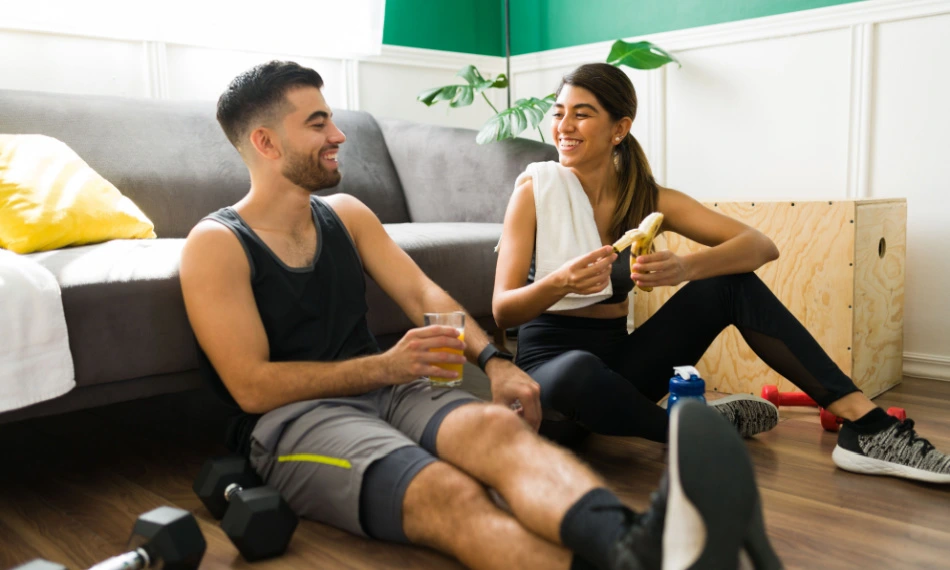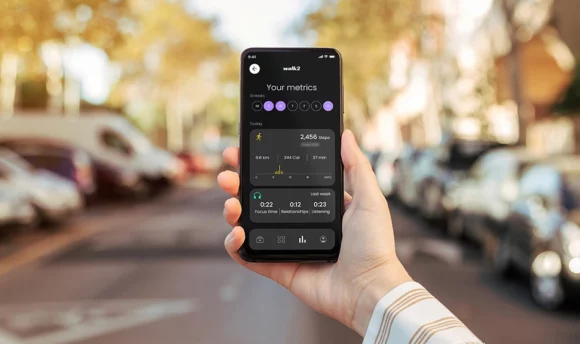What to Eat Before a Workout? 10 Sweat Session Starters
Boost your gym game with the right pre-exercise meals

When it comes to achieving your fitness goals, what you eat before your workout can significantly impact how you feel and whether you perform optimally.
Consuming the right foods at the right time gives your body the energy to power through your sweat session. However, if you overeat or eat unhealthy foods shortly before your workout, you may experience stomach upset from cramping to diarrhea. Or worse, you may feel slow and sluggish, leading to poor performance at the gym.
Learn whether you should eat before a workout and the best types of food you should eat before your workouts.
What Is Sports Nutrition? The Basics
Sports nutrition is a specialized field focusing on a well-designed nutrition plan that enhances athletic performance and supports the well-being of people engaged in physical activities.
Sports nutrition gives the right foods, energy, nutrients, and liquids to hydrate the body to function at its best. A sports nutrition diet may change depending on daily energy needs.


“Good pre-workout nutrition is always going to contain some combination of hydration, electrolytes, energy, and protein. Generally speaking, shorter, more intense workouts like strength training will require more protein, while endurance sports will put a premium on hydration, electrolytes, and sustainable energy.” — says Catherine Rall, a registered dietitian at Happy V.
Key nutrients in sports nutrition
Sports nutrition ensures athletes receive the right balance of macronutrients such as carbohydrates, proteins, and fats and micronutrients like vitamins and minerals to meet their energy needs and promote optimal physical function.
Carbohydrates are either simple or complex and are the primary energy source for the human body. Your digestive system breaks down carbs into glucose, which provides energy to your muscles, cells, and organs.
Examples of healthy complex carbohydrates include whole-grain bread, oats, potatoes, and fruits and vegetables.
Eating protein before a workout is essential to enhance athletic performance. You need enough protein intake to support muscle growth and recovery and to help build and maintain lean muscle mass.
Proteins include animal sources like fish, meat, milk, and poultry.
Fats are part of a healthy diet and provide essential energy, especially during prolonged and moderate-to-low-intensity exercise. Choose unsaturated fats that come from plant sources like nuts and olive oil.
Hydration and electrolytes are also important for health and peak performance. They help with fluid balance and muscle function. While everybody loses water during the day, active adults and athletes lose more water and electrolytes, such as sodium, potassium, and magnesium, sweating during vigorous workouts.
Energy requirements
Energy requirements in sports nutrition vary based on the type of sport, the duration, and the intensity of the activity. If you’re involved in endurance sports, such as long-distance running, cardio, cycling, or swimming, consuming high-energy foods like carbohydrates is essential to sustain your energy levels throughout the event.
If you’re engaged in intense workouts, such as weightlifting or sprinting, you will need adequate amounts of all macronutrients for muscle development. Sufficient protein and carbohydrate intakes are important for muscle repair and growth and support quick energy bursts.
You may not need sports nutrition if you’re just starting your workout or engage in moderate exercise like jogging or dancing three or four times a week, lasting up to an hour. A well-balanced and nutritious diet that meets overall energy and nutrient needs is sufficient to support your health and fitness goals.
Factors that may determine how you fuel your workouts
Several factors may influence how you fuel your workouts:
- Dietary requirements: Your diet will determine which fuel source is used, which impacts your performance level. If your diet is high in carbohydrates, your body will use more glycogen as fuel. The recommended calorie intake for endurance athletes is 60–70% of calories should come from carbs, 10-15% from protein, and 20–30% from fat.
If your diet is predominantly high in fat, your body may begin using fat as its primary fuel source. However, you should consider the timing of high-fat meals before a workout. Due to fat’s slow digestion, it may take a while for the stomach to empty, which can cause discomfort during physical activity. To avoid potential digestive problems, fats should be consumed in moderation and at the appropriate time relative to your workout, even though they are essential to a balanced diet.
- Eating Habits: The timing and content of your meals affect the effectiveness of your workouts. Getting enough fuel before an exercise is crucial, but not over-fueled. General guidelines suggest waiting 3-4 hours to exercise after consuming large meals and at least an hour after a small meal or snack before working out.
- Workout Intensity: The intensity of your workouts directly affects your fueling requirements. If you engage in high-intensity activities, you will require quick-acting carbohydrates. If you’re involved in endurance exercises, you’ll need a balance of carbohydrates and fats for sustained energy.


“When it comes to prepping for a workout, forget those “magic” supplements promising instant results. Real, whole foods are your best bet. And here’s a tip: steer clear of heavy or high-fat meals right before you hit the gym, as they can cause discomfort during your workout, making it harder to move and perform at your best. Stick to lighter, easily digestible options, such as Greek yogurt with berries, to fuel your workout without feeling weighed down!” — says Krista Wale, RD, LDN at Louisiana Nutrition Associates.
What to Eat Before a Workout? Top Foods to Fuel Your Journey
Choosing the right foods before working out is essential to supply the energy and nutrients you need to support your performance. Here are the 10 top foods to consider for pre-workout fuel:
#1 Banana
Also known as nature’s power bar, bananas are not only delicious and portable but are also rich in carbs and easy to digest, providing a quick energy boost. They also contain potassium, which may help prevent muscle cramps and support nerve function.
Enjoy a banana alone or pair it with a small handful of almonds for a balanced combination of carbohydrates and healthy fats.
#2 Oatmeal
Oatmeal is high in fiber, releasing carbs slowly. This gradual release keeps your energy levels consistent throughout your workout, allowing you to train harder for longer. Oatmeal also contains vitamin B, which promotes the conversion of carbohydrates into energy.
Prepare a bowl of oatmeal with low-fat milk or water. Top with sliced strawberries and a drizzle of honey.
#3 Greek yogurt with fruits
Fat-free plain Greek yogurt is a great pre-workout snack with twice the protein of regular yogurt. Fruits add vitamins and carbohydrates. This combo is quite filling without being heavy, and it’s easy to eat.
Mix Greek yogurt with a handful of mixed berries like raspberries and blueberries. You can add a few almonds for some healthy fats to kick your workout into high gear!


“Greek yogurt paired with fresh fruit gives you a double whammy of benefits before your workout. The yogurt delivers a blend of carbs and protein, offering that quick energy boost and helping with muscle recovery post-workout.
Adding some fruit gives you natural sugars for that instant pick-me-up. Now, if you’re more into a savory pre-workout snack, consider a turkey sandwich on whole-grain bread. This combo of lean protein from the turkey and complex carbs from the whole grains, ensures you have a balanced and sustained source of energy to power through your workout.”
#4 Peanut butter & jelly with whole grain bread
A peanut butter and jelly sandwich isn’t only for kids. You can snack on this American classic before you start an intense exercise regimen.
Whole-grain bread provides complex carbohydrates, and peanut butter offers a mix of protein and healthy fats, which can help you feel full and prevent binges and cravings after a workout.
Use natural, unsweetened nut butter and jellies to make your PB&J. Try switching from regular white to whole wheat bread for even more nourishment.
#5 Hard-boiled eggs
Hard-boil a few eggs if you don’t have time to prepare a pre-workout scramble in the morning. Eggs make a great pre-workout meal because they have few calories and are nutritionally balanced.
Hard-boiled eggs are also a protein powerhouse, containing essential amino acids for muscle support. They are also a great source of heart-healthy fats and essential nutrients that support muscle recovery after high-intensity workouts.
Boil a couple of eggs in advance, keep them in your fridge, and just have two or three before your workout session.
#6 Cottage cheese
Cottage cheese is high in protein and low in fat. It contains whey protein and casein protein. Whey helps your body burn fat and build muscle, while casein feeds your muscles gradually.
Make your bowl of cottage cheese with a mixture of apricots or raisins for a refreshing and protein-packed pre-workout snack.
#7 Avocado spread on toast
Avocado is a great healthy fat you can snack on before exercise and won’t leave you feeling queasy or heavy. It provides sustained energy, while whole-grain toast adds complex carbohydrates.
Mash half an avocado and spread it on whole-grain toast. Sprinkle with a pinch of sea salt and pepper.
#8 Fruit smoothie
Fruit smoothies are delicious drinkables to snack on before working out. Fruits are a natural supply of carbohydrates that your body may use as fuel during an intense workout. Smoothies may also help hydrate your body, which is necessary for optimal performance.
However, many store-bought alternatives are high in sugar, adding unnecessary calories. The best option is making your low-calorie smoothie. Use skim milk, fat-free Greek yogurt, and unsweetened frozen fruits.
#9 Trail mix
Trail mix is easy to prepare and provides protein and carbohydrates in a compact yet satisfying bundle! You only need nuts, dried fruit, and your favorite cereal. Toss in some vegan chocolate chips or popcorn for a more filling pre-workout snack.
#10 Whole grain cereal with milk
If you love morning cereal, a bowl of fiber-filled whole-grain cereal is an easy way to prepare for your workout. Whole grain cereal contains easy-to-digest carbs that pack a lot of energy. Milk provides protein and hydration.
Choose a whole-grain cereal and enjoy it with low-fat milk. Add sliced banana or berries for extra flavor and nutrients.


“One of the biggest myths out there is that pre-workout nutrition really only matters for bodybuilders and hardcore strength training. The truth is that the right nutrients are going to help your body perform at its best and recover more quickly no matter what kind of exercise you’re engaging in.”
Foods to Avoid Before a Workout
Certain foods can limit workout performance if consumed too close to exercise because of their potential to cause stomach upsets or low energy levels.
Foods high in fats, especially saturated fats, can be difficult to digest and may stay in the stomach for too long, leading to a feeling of heaviness and sluggishness. You may also experience stomachache, cramping, and nausea because the blood that should deliver oxygen to muscles will be diverted to the stomach instead.
Avoid fried foods like fries, potato chips, fatty cuts of meat, and heavy sauces or dressings.
While high-fiber foods are healthy, they can cause bloating and gastrointestinal discomfort. Digesting fiber takes time and may also divert blood flow away from muscles, affecting performance.
Avoid beans, lentils, broccoli, cauliflower, and high-fiber cereals if you’re prone to bloating.
Remember that everyone’s body reacts differently to foods, so pay attention to what works best for you. Experiment with different options and observe how your body responds to find the most suitable pre-workout choices.
A Word From Our RD


When planning for your pre-workout meals or snacks, it’s essential to ensure you include all macronutrients–carbohydrates, proteins, and healthy fats. And don’t forget about hydration. Drinking a lot of water is important for optimal performance.
Dehydration can lead to fatigue, decreased coordination, and impaired exercise capacity.
When exercising for an hour or less, water is all you need to stay hydrated. If your training is intense or lasts longer than 90 minutes, a sports drink or coconut water can help supply electrolytes like sodium, which helps in fluid balance, and carbohydrates, which can boost energy and prevent fatigue.
FAQ
For peak performance and to avoid stomach issues, eat a balanced meal containing carbs, proteins, and fats 3 to 4 hours before your workout. If it’s a smaller snack, consume it 30 to 60 minutes before your exercise.
While some research supports exercising on an empty stomach, it may not be a good option. Working out on an empty stomach may cause you to burn more energy and reduce your stamina. You may also experience nausea and lightheadedness because of low blood sugar.
You should eat both before and after a workout. Both pre and post-workout nutrition are important. Eating a balanced meal with all macronutrients 2-3 hours before exercise gives your body energy to power through your training. Consuming a combination of carbs and proteins after a workout promotes recovery and increases muscle protein synthesis.
You should wait 3 to 4 hours after a larger meal, 1 to 2 hours if you ate a small meal, and 30 to 60 minutes if you snack to avoid stomach issues and fuel your workout.
Conclusion
Pre-workout nutrition is important when it comes to attaining your fitness goals. Remember that exercise and diet go hand in hand.
If done correctly and consistently, eating the right meals or snacks before working out can complement your daily exercise regimen and help you get closer to your target body. Even if you’re trying to lose weight, ensuring you get enough energy is important to benefit from your workouts.
Remember to stay hydrated and listen to your body’s signals. Your fitness journey is unique, so embrace discovering what fuels your workouts effectively. Experiment with food choices and timings to find what suits your body best.

















































 Select your language:
Select your language: 







